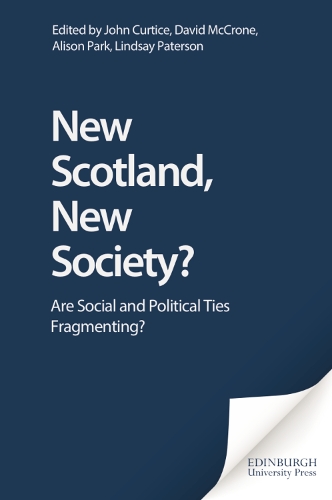
New Scotland, New Society: Are Social and Political Ties Fragmenting
(Paperback)
Publishing Details
New Scotland, New Society: Are Social and Political Ties Fragmenting
By (Author) John Curtice
Edited by David McCrone
Edited by Alison Park
Edited by Lindsay Paterson
Edinburgh University Press
Polygon at Edinburgh University Press
21st March 2002
United Kingdom
Classifications
Professional and Scholarly
Non Fiction
Public opinion and polls
Social and ethical issues
Central / national / federal government
303.3809411
Physical Properties
Paperback
234
Width 156mm, Height 234mm
380g
Description
This text asks a series of vital questions regarding the attitudes and behaviour of the Scots: are the ties that bind people to each other and to the democratic system fragmenting Do people no longer trust each other How do people relate to each other in terms of social trust How do they relate to social institutions such as the family and systems of morality Is constitutional reform restoring that trust Drawing on the Scottish Social Attitudes Survey and its predecessors, the overall aim of the book is to provide an independent account of public opinion in post-devolution Scotland. The chapters cover a range of contemporary debates. Attitudes to key issues such as co-habitation, teenage pregnancy, religion, sexuality, abortion, and racial prejudice are be explored. The capacity of Scotland's political institutions to restore trust are questioned, and the links between the trust which people have in each other and the trust they have in their institutions are tested. These attitudes are set in context over time and also in comparison with the rest of the UK, to see how attitudes have developed, and whether Scottish attitudes are distinctive. Much of the public debate in Scotland in recent years has been about constitutional and political change. This book moves beyond these issues to look at their social basis. It asks whether popular attitudes might actually be even more fundamental than the undoubtedly important constitutional upheaval that Scotland has recently experienced.
Reviews
Fascinating insights into Scottish attitudes ! It will be particularly of interest to academics and politicians, as well as undergraduate and postgraduate students in sociology and territorial politics. Fascinating insights into Scottish attitudes ! It will be particularly of interest to academics and politicians, as well as undergraduate and postgraduate students in sociology and territorial politics.
Author Bio
John Curtice is a Professor of Politics and Director of the Social Statistics Laboratory at Strathclyde University, and Research Consultant to the Scottish Centre for Social Research. He is a regular commentator in the Scottish and British media. Publications include The Rise of New Labour, (with Heath, A. & Jowell, R.) (Oxford University Press, 2001) and New Scotland, New Politics (with Paterson, L., Brown, A., Hinds, K., McCrone, D., Park, A., Sproston, K., & Surridge, P.) (Polygon, 2001). David McCrone is a Professor of Sociology, and co-director of the University of Edinburgh's Institute of Governance. Publications include Has Devolution Delivered (ed with Bromley, C., Curtice, J. and Park, A.) (Edinburgh University Press, 2006) and Living in Scotland: social and economic change since 1980 (with L. Paterson and F. Bechhofer) (Edinburgh University Press, 2004). Alison Park is at the National Centre for Social Research, London. Co-author of The Rise of New Labour (Oxford University Press, 2001) and New Scotland, New Politics (Polygon at Edinburgh, 2001). Lindsay Paterson is Professor of Educational Policy at the University of Edinburgh. His books include The Scottish Electorate, >A Diverse Assembly, The Autonomy of Modern Scotland and Politics and Society in Scotland.
